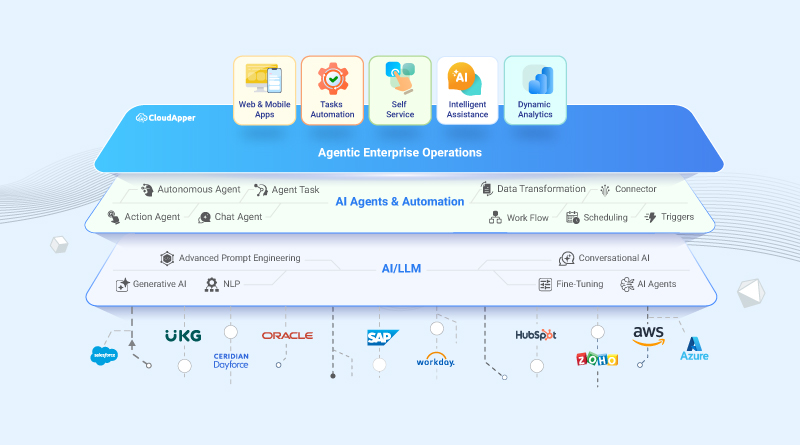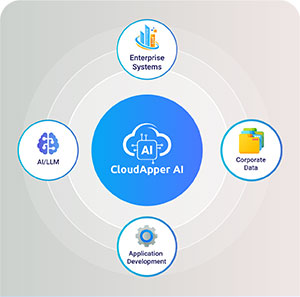CloudApper AI revolutionizes healthcare by reducing worker burnout, enhancing patient experiences, and streamlining tasks. Explore more on our blog post below to discover how AI is transforming patient-centric care.
Table of Contents
In the rapidly evolving landscape of healthcare, Conversational AI emerges as a transformative force, reshaping patient experiences and alleviating healthcare worker burnout. CloudApper AI, with its holistic platform, paves the way for seamless integration and implementation, propelling healthcare providers into a new era of efficiency and superior care.
Use Cases for AI In Healthcare
1. Reduce Worker Burnout
Imagine a healthcare ecosystem where nurses can effortlessly address equipment issues through AI interactions. CloudApper AI steps in, streamlining communication channels and automating tasks, such as arranging replacements, freeing healthcare professionals from unnecessary stress. With the burden of routine concerns lifted, the focus shifts to delivering quality patient care.
2. Enhance Patient Experience
Conversational AI becomes the conduit for patients seeking to navigate the complexities of healthcare. Scheduling an MRI becomes a straightforward conversation, with AI presenting available slots promptly. Patient feedback, a crucial component for healthcare improvement, is seamlessly collected, fostering a patient-centric approach.
3. Healthcare Quality Improvement
CloudApper AI introduces an interactive feedback loop, enabling healthcare providers to gauge patient satisfaction and uncover areas for improvement. Patient ratings become instrumental in shaping service delivery, ensuring continuous enhancement in healthcare quality.
4. Elevate Patient Engagement
Conversational AI becomes the bridge for 24/7 support, a game-changer in patient engagement. Patients can inquire about insurance coverage, seek billing details, and even receive personalized assistance in understanding complex regulations like HIPAA. This unprecedented accessibility enhances patient engagement and overall satisfaction.
5. Streamline Routine Tasks and Ensure Compliance
CloudApper AI transforms routine tasks, from patient registration to insurance coverage checks, into effortless conversations. It ensures compliance with regulations like HIPAA, aligning seamlessly with major laws and security measures. The result is a healthcare landscape that operates efficiently, securely, and in strict adherence to regulatory standards.
Benefits of Using AI in Healthcare
Integrating AI assistants into healthcare heralds a paradigm shift, offering multifaceted benefits that enhance patient care, streamline workflows, and empower healthcare professionals. These virtual assistants provide 24/7 support, ensuring immediate responses to patient inquiries and facilitating timely interventions. The result is improved patient satisfaction and a positive impact on the overall healthcare experience.
AI assistants excel in automating routine tasks, from appointment scheduling to billing inquiries, freeing up valuable time for healthcare staff to focus on more complex and critical aspects of patient care. With the ability to collect and analyze patient data, these assistants contribute to personalized healthcare experiences, tailoring interactions based on individual preferences and medical history.
Moreover, AI assistants play a pivotal role in healthcare quality improvement by gathering patient feedback and insights. Real-time feedback loops enable healthcare providers to identify areas for enhancement and deliver services aligned with patient expectations.
In the realm of compliance, AI assistants uphold stringent data security standards, ensuring adherence to regulations like HIPAA. By streamlining processes, enhancing efficiency, and fostering patient engagement, AI assistants emerge as indispensable tools, driving the healthcare industry towards a future marked by innovation, accessibility, and improved patient outcomes.
Revolutionizing Patient-Centric Care
CloudApper Conversational AI’s impact on healthcare is profound, ushering in a future where patient experiences are personalized, healthcare workers are empowered, and operations are streamlined. The generative power of AI is harnessed to create a healthcare ecosystem that thrives on innovation, efficiency, and, above all, patient well-being.
What is CloudApper AI Platform?
CloudApper AI is an advanced platform that enables organizations to integrate AI into their existing enterprise systems effortlessly, without the need for technical expertise, costly development, or upgrading the underlying infrastructure. By transforming legacy systems into AI-capable solutions, CloudApper allows companies to harness the power of Generative AI quickly and efficiently. This approach has been successfully implemented with leading systems like UKG, Workday, Oracle, Paradox, Amazon AWS Bedrock and can be applied across various industries, helping businesses enhance productivity, automate processes, and gain deeper insights without the usual complexities. With CloudApper AI, you can start experiencing the transformative benefits of AI today. Learn More

CloudApper AI Solutions



- Works with









- and more.
Similar Posts

What Experts Say About Enterprise Business Automation & Why You…

Enterprise Automation with AI: How to Streamline Your Business Operations





